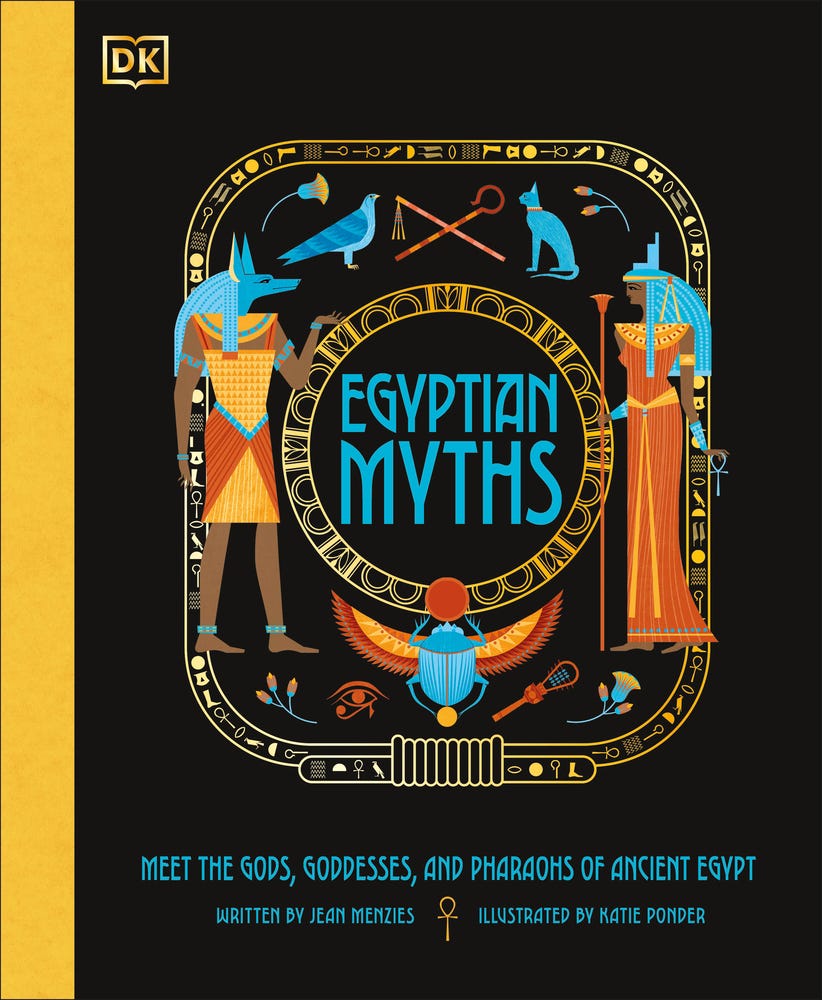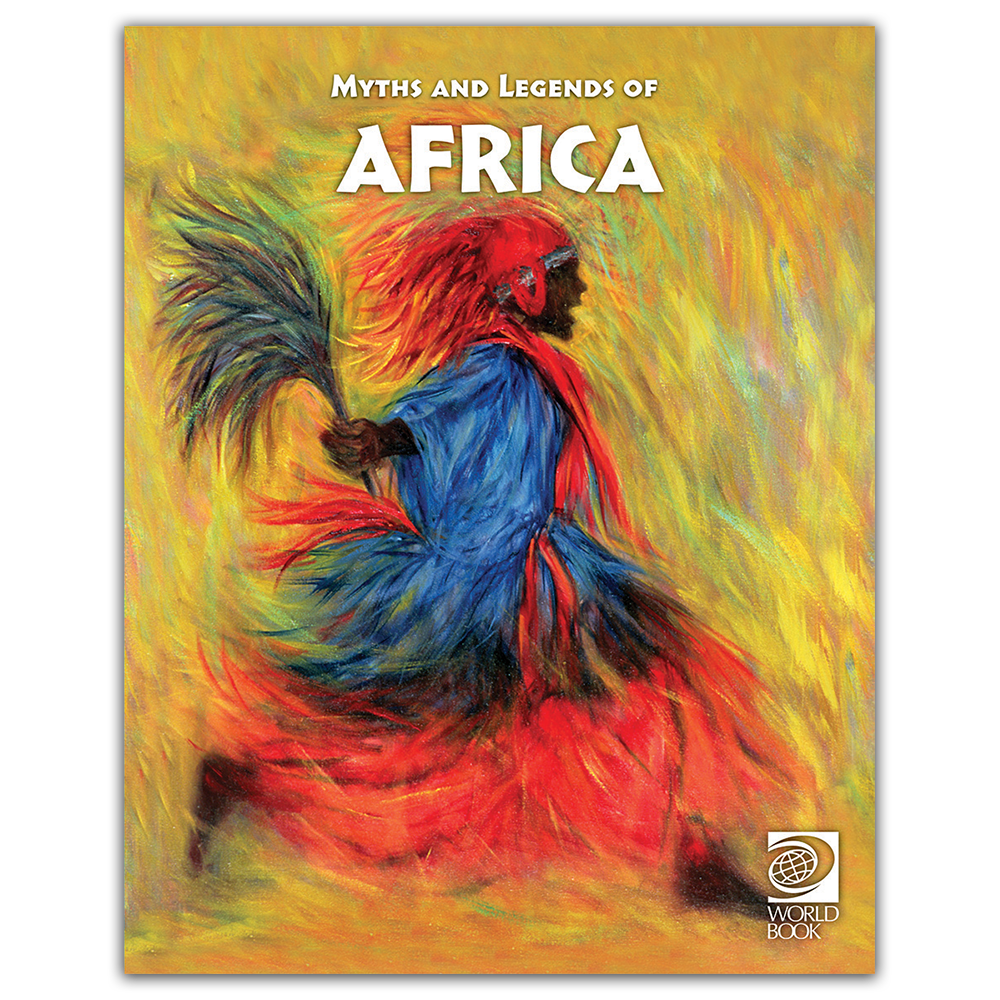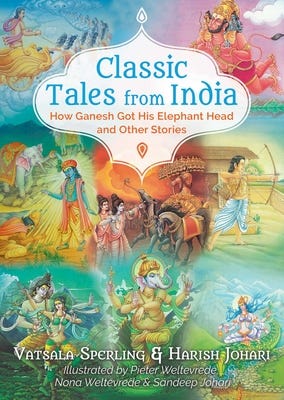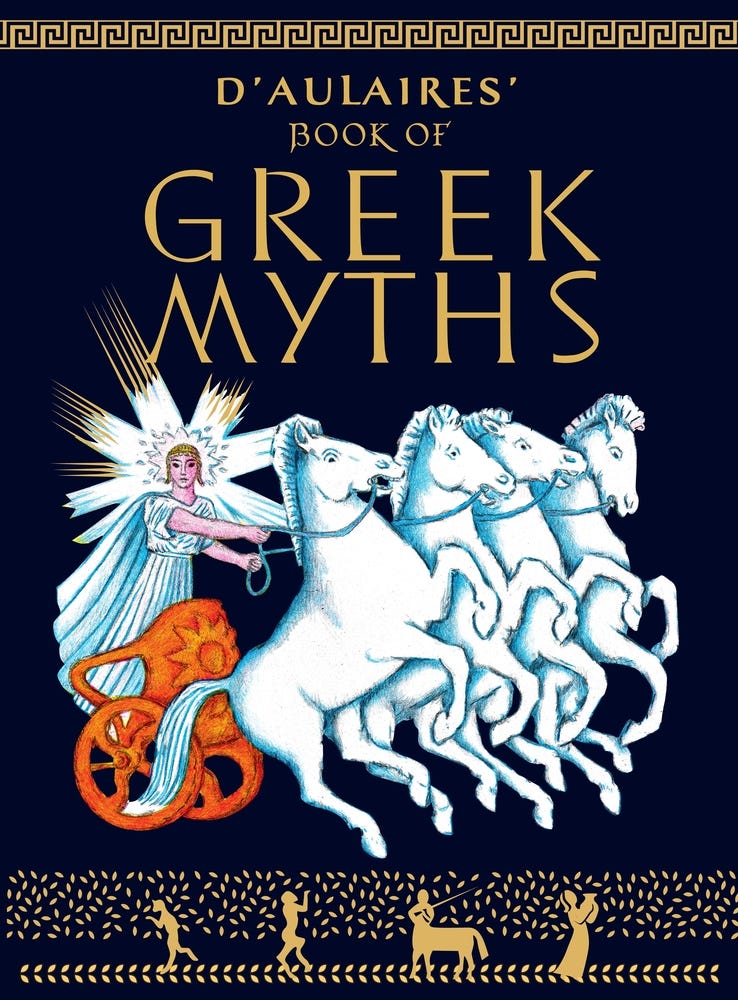
Weeks ago some friends and I ventured out to New York City to watch the Broadway musical, Hadestown. It’s a modernized retelling of the tragic myth of Orpheus and Eurydice. I love Roman and Greek mythology so I was already sold on the musical even before I read the raving reviews.
The entire time, I marveled at the fresh, relevant take on this tragic romance while also wondering what it is about mythologies that they have endured for millennia. Some of these myths are insane/gross/disturbing (incest, anyone? 👀) and yet are still going strong. Cancel culture clearly doesn’t seem to apply to mythology.
My fascination for mythology was first rooted in my religious experience (Hindu mythology is the foundation of Hindu spiritual belief). In middle school, I was exposed to Egyptian mythology. Then four years of high school Latin paved the path for an everlasting love of Roman and Greek mythology.
What is it about mythology, legends, and folktales that holds us in thrall? For me, it’s the fantastic, the unlikely, the unpredictable, and, most of all, the layers. The story you see and hear and the story wrapped within—the one you ponder upon days later, your mind toying with it like a Rubik’s cube.
If you live in the West, you’re probably already familiar with Greek, Roman, and maybe even some Norse mythology. But there’s a whole vast world of mythology yet to be explored. Today, I hope to bring some of that to light (many of which were new to me too).
Before we jump into it, I want to distinguish between myths, legends, and fairytales:
Mythology — usually features a pantheon of gods and goddesses; culturally accepted to be a truth (or have been a truth for ancient, no longer practiced religions)
Legend — stories believed to have been true but are unverified; think King Arthur or Johnny Appleseed. These stories often take on lives of their own as time goes on but most people believe that the heroes at the center of them did exist in some fashion
Fairytales — stories featuring common people whose lives are upended through fantastical elements (giants, fairy godmothers, etc.)
And finally, this one is for Mr. Rizzo, my beloved high school Latin teacher.
Let’s get reading!
1. Myth Atlas
Written and Illustrated by Thiago de Moraes
If your kid is new to (any) mythology, this book is the place to start. Each mythology chapter begins with a huge spread highlighting the key players. The pencil illustrations are soothing with soft hues and intricate, finely detailed pencil work. Following the huge spread are a few choice stories from that mythology demonstrating the cultural significance underpinning the stories. The writing style is delightfully engaging—it doesn’t take itself seriously and is hilariously tongue-in-cheek. For example, in the Native American chapter, there are two stories titled: “Sedna—There are better things to eat than your own parents” and “The Hunters and the Great Snake—Very, very occasionally, it’s a good idea to be a picky eater.” Now doesn’t that make you want to dive right in and read the story? If you’re looking for a comprehensive, instructive read, you won’t find this book satisfying. But it’s the perfect book for dipping your toes into the global mythology pool.
Buy now*: English | Spanish
2. DK’s Egyptian Myths: Meet the Gods, Goddesses, and Pharaohs of Ancient Egypt
Written by Jean Menzies and Illustrated by Katie Ponder
I’m always surprised that Egyptian mythology isn’t nearly as popular as its Roman and Greek counterparts. I think it’s because exposure to ancient Egypt is limited to human exploits (think Cleopatra and Mark Antony). This book will bring Egyptian gods, goddesses, and pharaohs to life. Ponders’ bright, angular digital artwork draws you in right away. The book weaves stories together of the various gods and goddesses you meet. I appreciated the little synopses of each mythical character between the stories and how the stories build upon each other. At the end is a helpful summary of how Egyptian mythology entered the historical record and what we know today based on archaeological findings. It’s easy to get lost in these pages and I highly recommend this as a great entry point into learning about ancient Egypt.
Also recommend: National Geographic Kids: Treasury of Egyptian Mythology
Buy now*
3. World Book: Myths and Legends of Africa
Written by Scott A. Leonard
This is more of a non-fiction read—it’s one of many in World Book’s encyclopedic “Myths and Legends” series. It’s hard to find the less popular mythologies being written about by the major publishing houses. This is why encyclopedias are the best. These mid-sized books are pretty brief—less than 100 pages—but they’re crammed with vivid stories and vignettes of how these stories factor into cultural norms. Rather than illustrations, the books use photography to bring these stories to life. This book doesn’t dive deep into any one African mythology; instead, it presents a few stories from various African mythologies and then shares the present-day culture of those communities. The first story is the Ashanti story of Anansi (yes, that trickster spider!) and as kids read they’ll better understand why spiders are often found in corners and shadows. After the story, we learn more about the Ashanti people and their culture. And so it goes… While the stories are engaging, the teaching of the cultures behind these myths makes this book truly worth reading. The World Book Myths and Legends series is incredibly comprehensive spanning major and minor mythologies from nearly every continent.
Buy now | Buy the entire set
4. Classic Tales from India: How Ganesh Got His Elephant Head and Other Stories
Written by Vatsala Sperling and Harish Johari and Illustrated by Pieter Weltevrede, Nona Weltevrede, and Sandeep Johari
If you’ve ever wondered what it would look like to practice a polytheistic religion, you don’t have to look further than South Asia. Hinduism is a religion that’s alive and well and completely incorporated into modern traditions. I think people generally steer clear of Hindu mythology since it’s the soul of a modern-day religion but here’s my pitch to you: Hindu mythology can be fun! There are lots of crazy things that happen which makes for a thrilling read (and why we all love reading mythology stories). This book strikes the perfect balance of sharing standalone stories and compelling overviews of the great Hindu epics. At the end of each story, is a note to parents and educators that encourages us to consider the underlying principles of the story and why that story holds relevance today. The lush watercolor illustrations are stunning in their detail. I especially appreciated them for their accuracy in replicating traditional Indian art styles. It transported me to my childhood when I first read many of the same stories featured in this book.
The books/comics that introduced me to the vast world of Hindu mythology when I was a kid: Amar Chitra Katha comic books
Buy now*
5. D’Aulaires’ Book of Greek Myths
Written and Illustrated by Ingri and Edgar Parin D’Aulaire
Last, but certainly not least, is this iconic tome of Greek myths. If someone says they have read a book about Greek mythology to their kids, I almost always assume it is this one. There’s a reason this particular book is so popular: the writing is excellent and the pencil drawings enchanting. I’m always awed by the D’Aulaires’ eloquent and layered storytelling. The prose is simple but mature—kids will understand what is happening but may occasionally stop and ask you what something means (this is good! Reading up is good!). As for the layers, each story has its core focus but tiny little turns are taken here and there to tell micro-stories. For example, in the story about Io, there are mentions of how Hera’s favorite guard’s eyes end up on the plumage of a peacock and the peacock falls so in love with his feathers, that he becomes “the vainest of all animals.” It’s these details that make the D’Aulaires’ worldbuilding so complete and satisfying.
Also recommend (great for younger kids): McElderberry Book of Greek Myths
Buy now*
Additional tips & information…
Here are some more of my favorite mythology books
Mythological stories are great to cozy up to and read before bedtime!
If you’ve ever wondered if any of these mythologies are still practiced today the answer is sort of: Nordic | Greek | Egyptian |
Let’s talk…
Are you a mythology aficionado? Which world mythology is your favorite?
What part of a mythology is most fascinating to you? (I’ll share mine in the comments!)
Which world mythology were you first exposed to?
*Thank you for using (at no additional cost to you) the affiliate links in this post! :-)











Love this list. We have the Myth Atlas and a DK World Myths, which organises myths across regions by theme (origin myths, etc). Other favourites are D'Aulaire's Norse Myths, and another very 1980s viking myths, which is beautifully written, and now the author is escaping me.
We also really enjoyed the "Who Let the Gods Out" series on audio, until book 3, when the mum started to really decline and my sensitive kiddo had to tap out. They were very funny.
We borrowed a few of your recs from the library after reading this post, and my 7 year old loved them so much that were starting on a unit study about Greek mythology in our homeschooling now! Thanks again for the thoughtful book suggestions!